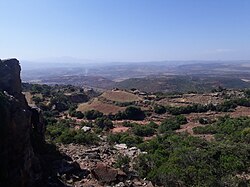Agbe is the main locality of the Tanqua Millash district of the Tigray Region of Ethiopia. The municipality (tabia) centre is in Sele town. Until January 2020, Agbe belonged to the Abergele district.
Agbe
ኣግበ Sele | |
|---|---|
 View from Debre Sema'it to Agbe lowlands | |
| Coordinates: 13°33′N 39°3′E / 13.550°N 39.050°E | |
| Country | Ethiopia |
| Region | Tigray |
| Zone | Central |
| Woreda | Tanqua Millash |
| Elevation | 1,650 m (5,410 ft) |
| Time zone | UTC+3 (EAT) |
Geography edit
The tabia occupies the southwestern footslopes of the Degua Tembien massif.
Geology edit
From the higher to the lower locations, the following geological formations are present:[1]
Springs edit
As there are no permanent rivers, the presence of springs is of utmost importance for the local people. The main springs in the tabia are may Hitsare and Ayni Sele they are in Agbe, where construction works for a soft drinks factory have been started.[2]
Settlements edit
The tabia centre Sele holds a few administrative offices, a health post, a primary school, and some small shops.[2] There are a few more primary schools across the tabia. The main other populated places are:[3]
- Agbe
- Kalazban
- Ch’ekh
- Milehay Mereu
- Meserete Birhan
- Babdre
- Enda Abune Hawarya
- Deleq
- Sheka ( shagla Muren)
- Gereb Giba
- Shewuate Hugum
- Adi Wahro
- Majur
- Shekah Fuqur
- Adi Siera
- Adi Qeley
- Adenna
- Adi Nifas
- Hadush Adi
- Jibare
- Zuqli
- Menew
- Yeresere
- Enda Maryam Qorar
- Kerene
- Dawusra
- kamshana
- Seyemtirba
Economy and livelihood edit
The population lives essentially from crop farming, supplemented with off-season work in nearby towns. The farmers have adapted their cropping systems to the spatio-temporal variability in rainfall. In a certain way, there is irrigation of various fruits and peppers in “Shekah” irrigation with water from both sources Hitsare and Ayni Sele springs [4]
Historically Friday was the Market day of Agbe but Since 2004, it has been changed to Saturday by order of the local administration this day Saturday is the market day.[2]
History and culture edit
History edit
The history of the tabia is strongly confounded with the history of Tembien.
Religion and churches edit
Agbe is the birthplace of Ligaba Guangul Riese, who was the palace protocol of Emperor Yohannes IV. Children: Degezmati Gebremedhn Guangul and Degezmati Seyoum Guangul Grand Children: Fitawurari Girmay and Fitawurari Yohannes
Agbe is surrounded by many ancient monasteries including Qeqema Maryam, Chikh Selassie, and Mennewe Libanos
Most inhabitants are Orthodox Christians.
Roads and communication edit
The main road Mekelle – Hagere Selam – Abiy Addi runs through the centre of the tabia. There are regular bus services to these towns.
Tourism edit
Its mountainous nature and proximity to Mekelle makes the tabia fit for tourism.[5]
Trekking routes edit
Trekking routes have been established in this tabia.[6] The tracks are not marked on the ground but can be followed using downloaded .GPX files.[7]
- Trek 8, is from Agbe to Kemishana, and further across May Selelo and Zikuli Rivers, along gorges and Zeyi cave to Inda Maryam Qorar
- Trek 19, from Sele to Debre Sema'it, and then it continues to Inda Maryam Qorar
Both treks involve a vertical interval of more than one kilometer and require good physical conditions.
Accommodation and facilities edit
Though facilities are basic, the inhabitants are hospitable.[8]
References edit
- ^ Sembroni, A.; Molin, P.; Dramis, F. (2019). Regional geology of the Dogu'a Tembien massif. In: Geo-trekking in Ethiopia's Tropical Mountains - The Dogu'a Tembien District. SpringerNature. ISBN 978-3-030-04954-6.
- ^ a b c What do we hear from the farmers in Dogu'a Tenbien? [in Tigrinya]. Hagere Selam, Ethiopia. 2016. p. 100.
{{cite book}}: CS1 maint: location missing publisher (link) - ^ Jacob, M. and colleagues (2019). Geo-trekking map of Dogu'a Tembien (1:50,000). In: Geo-trekking in Ethiopia's Tropical Mountains - The Dogu'a Tembien District. SpringerNature. ISBN 978-3-030-04954-6.
- ^ Frankl, A. and colleagues (2013). "The effect of rainfall on spatio‐temporal variability in cropping systems and duration of crop cover in the Northern Ethiopian Highlands". Soil Use and Management. 29 (3): 374–383. doi:10.1111/sum.12041. hdl:1854/LU-3123393. S2CID 95207289.
- ^ Geo-trekking in Ethiopia's Tropical Mountains - The Dogu'a Tembien District. SpringerNature. 2019. ISBN 978-3-030-04954-6.
- ^ Description of trekking routes in Dogu'a Tembien. In: Geo-trekking in Ethiopia's Tropical Mountains - The Dogu'a Tembien District. SpringerNature. 2019. ISBN 978-3-030-04954-6.
- ^ "Public GPS Traces tagged with nyssen-jacob-frankl".
- ^ Nyssen, Jan (2019). "Logistics for the Trekker in a Rural Mountain District of Northern Ethiopia". Geo-trekking in Ethiopia's Tropical Mountains. GeoGuide. Springer-Nature. pp. 537–556. doi:10.1007/978-3-030-04955-3_37. ISBN 978-3-030-04954-6. S2CID 199198251.
